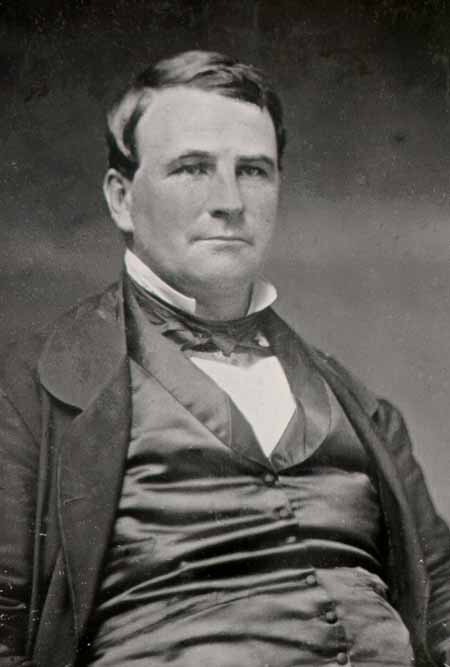
Davis, David
b. March 9, 1815, in Sassafras Neck, Maryland; d. June 26, 1886, in Bloomington, Illinois. Davis was born after his father
died, and he spent his early years living on his grandfather's plantation, with his mother and
stepfather in Baltimore, Maryland, and with his uncle in Annapolis, Maryland. During this time Davis attended boarding schools
in
Maryland. His mother and stepfather moved to Newark, Delaware, and Davis began attending New Ark Academy in September 1826.
Two
years later, Davis enrolled at Kenyon College in Gambier, Ohio. Davis graduated in September 1832 and soon thereafter began
studying law in the office of attorney Henry W. Bishop in Lenox, Massachusetts. While there, Davis met both his future wife,
Sarah
Walker, and his future law partner, Wells Colton. In 1834, Davis enrolled in the New Haven Law School, in New Haven, Connecticut,
but after less than one year, Davis moved to Pekin, Illinois, and opened a law office.
In 1835, he was admitted to the bar and moved to Pekin, Illinois, to begin the practice of law, but within a year he relocated
to
Bloomington. In 1837, Davis and Colton formed a partnership, and on October 30, 1838, Davis married Sarah Walker. Davis supported
the Whig Party, and in 1840, he was an unsuccessful candidate for the Illinois State Senate. Active in Whig politics, Davis
was
elected to the state legislature in 1844 and served as a member of the 1848 state constitutional convention. In 1848, Davis
was
elected judge over the Eighth Judicial Circuit, which at that time was composed of fourteen counties including Lincoln's home
county of Sangamon. This position brought him into close association with Abraham Lincoln. Judge Davis, Lincoln, and other
attorneys, rode the circuit each spring and fall for nearly ten years. In Davis's opinion, "Lincoln was happy, as happy as
he could be, when on this circuit and happy no other place." As judge of the Eighth Judicial Circuit, Davis
presided over hundreds of cases in which Lincoln was an attorney.
Davis worked to secure Lincoln's nomination at the Republican National Convention of 1860 in Chicago and actively campaigned
for
Lincoln's bid for the Presidency. He accompanied Lincoln on his inaugural journey from Springfield, Illinois, to Washington,
DC.
In 1861, President Lincoln appointed Davis to investigate claims in John C. Fremont's Department of the West in Missouri.
In 1862,
President Lincoln appointed Davis, still sitting as judge of the Eighth Judicial Circuit in Illinois, as an associate justice
of
the United States Supreme Court. As a justice of the Supreme Court, Davis presided over the federal circuit composed of Indiana,
Illinois, and Wisconsin. Davis was considered a civil libertarian on the Supreme Court because of his 1866 opinion in Ex
parte Milligan. Lambdin P. Milligan, an Indiana Democratic politician, was arreste d in 1864 and sentenced to death
by a military commission for conspiring against the United States. Davis held that martial rule "can never exist where the
[civil]
courts are open, and in the proper and unobstructed exercise of their jurisdiction."
After Lincoln's assassination, his family appointed Davis as administrator of Lincoln's estate. He increased the value of
the
estate before distributing it to Lincoln's heirs, Mary, Robert, and Tad. By 1875, Robert considered Davis "as a second father"
and
sought his support when it became necessary to commit Mary Lincoln to an insane asylum. Davis retired from the bench in 1877
after
being elected to the United States Senate. He resigned from the senate in 1883. Davis had invested in real estate with De
Witt
County attorney, Clifton H. Moore, and became a man of considerable wealth.
Bloomington Daily Pantagraph (IL), 28 June 1886, 2:1; John J. Duff, A. Lincoln: Prairie Lawyer
(New York: Bramhall House, 1960); John A. Garraty and Mark C. Carnes, eds., American National Biography (New
York: Oxford University Press, 1999), 6:181-82; Kermit Hall, ed., The Oxford Companion to the Supreme Court of the United
States (New York: Oxford University Press, 1992), 218-19; Allen Johnson, ed., Dictionary of American
Biography (New York: Charles Scribner’s & Sons, 1964), 3:1:110-12; Willard L. King, Lincoln's
Manager: David Davis (Cambridge, Massachusetts: Harvard University Press, 1960); Usher F. Linder,
Reminiscences of the Early Bench and Bar of Illinois (Chicago: The Chicago Legal News Company, 1879), 181-88;
Mark E. Neely Jr., The Abraham Lincoln Encyclopedia (New York: McGraw Hill, 1982), 77-79; John Palmer, ed.,
The Bench and Bar of Illinois: Historical and Reminiscent (Chicago: Lewis Publishing Co., 1899), 1:154-55,
541-49; Albert A. Woldman, Lawyer Lincoln (Boston and New York: Houghton Mifflin Company, 1936).
Illustration courtesy of the Abraham Lincoln Presidential Library, Springfield, IL.